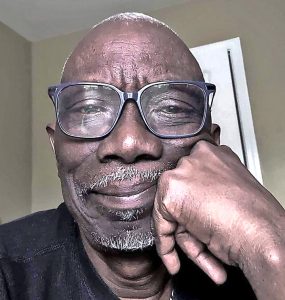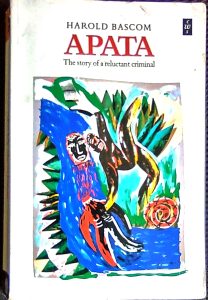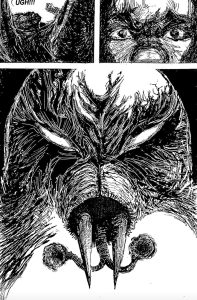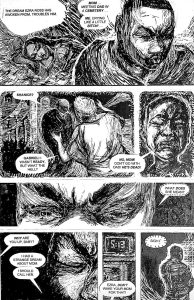Home Features Multiple Guyana Prize winner Harold Bascom aims for new horizons
He’s a novelist, artist, illustrator, playwright; and on Friday, March 1, he was awarded the Guyana Prize for Literature in the Drama category for an unprecedented fifth time.
At the healthy ‘young’ age of 72, the prolific, multi-talented and extremely disciplined Bascom has no intention of relaxing, but has rather added to his already demanding workload. Plays, a film script, art projects, a truly creepy graphic novel that’s set in a fictional US community, and a biography are just some of the projects he intends to complete this year.
Despite his demanding workload and work week, Bascom managed to squeeze Guyana Times into his schedule to speak candidly about his award, projects, challenges, and other aspects of his craft. We sat down with him for an interview recently, aspects of which are stated hereunder.
GT: How do you feel about winning yet again? And were you confident about winning?
HB: It always feels good to be winning again. As for whether I was confident about winning, the answer is yes. Let me address that: I knew my play was going to win like I knew that the four other Guyana Prize-winning plays I wrote were going to win. And I beg readers to understand that this is not arrogance; it is just cold, indifferent confidence in my ability to work hard to be the best.
I always dare myself to go above the ordinary. I would push my mind onto an intellectual level where most other Guyanese playwrights probably don’t care to go. I always tell myself that my competition doesn’t understand how much the creative process expects from them, and because of that they would be writing ‘soft’, meaning they would be writing about shallow, predictable things.
GT: That’s a daring answer, so I must ask you how you come to think that way about your fellow Guyanese playwrights.
HB: I lived most of my life in Guyana, and I know the intellectual level of the average Guyanese, now that reading has tanked generally. To write well, one needs to read well, and sadly, reading has ceased to be a priority on the agenda of my average countryman/woman. How many bookstores are in Georgetown? How many are in Linden? How many are in New Amsterdam? How many in Essequibo? How many would-be writers read voraciously now? It is through reading that one’s intellectual awareness becomes enhanced through ideas and broader human themes.
Then there is the sad fact that too many Guyanese have not been pushed to think critically. So, when that lack of reading is combined with the lack of critical thinking, I believe that shallowness is the result. As such, there’s no surprise that the average writer — in this context playwright —coming out of Guyana will be producing underwhelming plays.
So, yes, I knew I would have won with “UNFOUNDED”, and this has absolutely nothing to do with me being in the USA! I wrote the play “TWO WRONGS” in my Hadfield Street, Lodge home; it won the Guyana Prize in 1994. I also wrote the play “MAKANTALI” in Hadfield Street, and it won the Guyana Prize in 1996.
GT: What is the UNFOUNDED” about, and what spawned the idea?
HB: In “FOUNDED”, I set out to make aware that, as Guyanese, we need to analyze, in my view, what is the hypocrisy of our existence as a nationality. To do that, I crafted a multilayered drama with parallel stories to make the point. In the play, I created “BUDDAY” — a man mixed with all the possible races in Guyana, a true Guyanese — and put him in the face of the audience.
Budday, an in-your-face narrator and social commentator, intermittently converses with the audience as the play unfolds.
He also ties together the story of the controversial love affair between Tyrone Blackman and the extremely light-skinned Indranie Gunraj, even as the nation is gripped in anxiety over the rumour of an impending invasion by neighbouring Venezuela.
Let me add this: Should I be asked, “Why did you name your play ‘Unfounded’?”, I’d answer: Something ‘unfounded’ is something not based on fact, and in the context of our nation, as Guyanese, there is nothing more unfounded than our national motto: One People, One Nation, One Destiny. In this play, I thought to address the need for us to find that common ground and realize our unavoidable oneness.
GT: What is your writing process?
HB: My writing process begins with notes on my cell phone early in the morning while sitting up in bed. I would then email those notes to myself. Once out of bed, I’d go up to my office-studio, where I copy and paste those notes into a Word Document on my laptop, and the real writing begins.
That’s when I consider which voice will do the story justice, and then start firstly on the structure of the plot, and start fleshing out the characters with backstory and whatever research is necessary to make the piece of fiction work.
Then I’d write until something begins to shape up to my satisfaction. After a few hours, I often get a first draft that often feels good. Then I would check for the flow of it. That’s when I would activate Microsoft’s Text-to-Speech and listen to what I’ve written. If it sounds lumpy, I’d rewrite it until the cadence of the sentences is smooth to my ear.
Once I feel I have a good draft, the next step is getting feedback from my editors. I’d send the story out to them, and let them critique it coldly. Once the criticisms are back, I fix the things I agree need to be addressed, and then I would go for the final draft. Of course, I’d listen to the story once again, run it through Grammarly once again, and my process ends.
GT: How do you manage to write so vividly and realistically about a Guyana you left so long ago?
HB: Even though I’ve left Guyana since 1996 and am now residing in the USA, it’s as if I never left Guyana. My home is a little Guyana, and Guyana lives inside of me.
When it comes to research for one of my Guyanese plays, I continue to have friends in Guyana with whom I’m in easy contact through Facebook Messenger. Take the other day, when I was writing about Linden and needed to remember how many minutes it took to cross from Wismar to Mackenzie, I quickly opened up Messenger and asked a friend in Linden, and he gave me the answer. So, being able to write vividly and realistically about Guyana is easy. My soul is still there, and my recall of my country is sharp, even at age 72.
GT: What do you hope will come out of ‘Unfounded’ and your last play that won the Guyana Prize for Literature (Caribbean Award), namely ‘Desperate For Relevance’?
HB: When I wrote Desperate For Relevance, which won both the Guyana Prize and the Caribbean Award, I imagined that, somehow, it would cement cultural relations between Guyana and the wider Caribbean, from where the dead writers in the drama came. I thought theatre people in the region would look at it, maybe review it, maybe stage it, but there was silence. None from the Caribbean recognized the play, and it came to nothing.
Luckily, it is now being analyzed by academic and Guyana Prize-winning poet Berkeley Semple. Maybe something might still come out of Desperate For Relevance. Fingers crossed.
As far as what will come out of “Unfounded”, I don’t know. I hope it gets produced in Guyana and shown in centres in Guyana’s three counties.
GT: How do you feel that no one has attempted to push your plays through the Caribbean and further?
HB: I feel bad, but it is what it is. Listen, once you understand the cultural game as is played in Guyana, it doesn’t affect you that much. What do I mean? In Guyana, for a writer’s work to be pushed, he or she has to be of the right pedigree, the right qualifications, and above all, know the right people. If the majority of those attributes coincide, the sky is the limit.
Even though, before this win, I had won the Guyana Prize four times and was rated as a Caribbean Writers Series Novelist because of my novel “APATA: The Story of a Reluctant Criminal”, published by Heinemann Educational Books, if you Google the phrase “Guyanese writers,” you will not see the name Harold A. Bascom.
In New York, there is the Guyana Cultural Association which, through the years, has featured a lot of budding and established Guyanese writers, playwrights, novelists and painters in its GCA magazine. Let’s talk about that glossy periodical: How many times have they ever featured me or my work in it? Zero! NOT ONCE! It’s as if I do not exist.
This has always been baffling to many people who know the volume of work I’ve done as a Guyanese book illustrator, painter, novelist, writer and playwright, along with the number of Guyana Prizes that I’ve won. And what’s most ironic is that the founder, Vibert Cambridge, knows me and my work exceptionally well. We worked together when he was in the Guyana National Service. The late Claire Ann Goring knew me and my work exceptionally well also. Do you know how many times I’ve had to field the question, “Why, Harold? Why does the GCA treat you the way they do?” I’ve always shrugged and said, “Maybe it’s because I am not from Georgetown. Maybe they want to erase my name and everything I’ve ever done as a Guyanese. Maybe because I don’t have a degree. Maybe they’re afraid of me. I don’t know.”
GT: You came from relatively humble beginnings, do you sometimes look back with amazement at where you are today?
HB: No. I always knew I was destined to do significant things. Even as a child, growing up in New Road, Vreed-en-Hoop to a mother who was a housewife and a father who was a travelling salesman with a grip, selling raw cloth and female attire in Linden.
GT: How do you manage to be so prolific?
HB: I feel wired to write. I liken my need to be always writing as to what is said about some sharks: that they cannot stop swimming, lest they drown. With me, it’s as if I have to keep writing, or sink into irrelevance. And so, I’m always generating creative ideas, always thinking, “What if?”
I remember one day looking at my partner taking off her Covid mask after having arrived home from work one night, and the thought hit me: “What if someone, in the process of taking off their mask, takes off the bottom of their face along with the mask?” And out of that crazy thought the short story “The Last Variant” was born.
Another reason I manage to be prolific is that I’m always bubbling over deep inside with ideas that I feel I need to express — things I feel I need to say. As such, I’m ever pushing myself to meanings and points of view through fiction, be it an idea for a new play, a new short story. My questioning mind influences my output.
I’ve disciplined my mind to be focused, almost single-mindedly on a creative task; and through the years, I’ve learned to compartmentalize projects. In other words, I can do a series of different creative projects in a parallel and do each exceptionally well.
On the wall above my desk, for example, there’s a timetable; it reminds me of what I need to do each day, and when I enter into that specific project, it’s as if I’m entering a special world that carries its own creative discipline. I’m there.
Maybe that ability to multitask has something to do with my planet. See, I’m a Scorpio. Maybe it has something to do with my lifestyle; my life is frighteningly single-minded. All I live for is to learn something new every day and create. I hardly go out, I hardly interact with people, and I have few friends because I prefer to be alone. I’m homebound by choice.
GT: Do you think you’ve grown consistently?
HB: Yes. I feel I am “growing” consistently. Achieving one’s creative plateau is a quest one hopes to achieve before transitioning. After that, it’s up to someone else to take over from where you left off and take it to another level. I believe that. I am afraid of mediocrity, so I push my creative mind brutally. When I write, I always set out to say something profound in my work. As far as themes and plots go, I am not one for the predictable and that which can be considered run-of-the-mill. Even when my plots may seem ordinary, I push my mind for that deeper interpretation born of the deepest analysis as a social commentator.
I’ve always been faithful in my definition of what my role is as a writer, an artist, or a playwright. It is to be an antenna or a barometer for whatever society I find myself enmeshed in.
GT: You once said your father wasn’t too pleased about you, his seemingly dreamy son, leaving school to pursue an artistic career. What do you think he’d say if he could see your success?
HB: My father, Harold A. Bascom, Sr, was a piece of work. What is ironic about him was (that), even though he was the one cynical about me dabbling in my aspirations to be an artist, and that it was my mother who told him to leave me alone, that I knew what I was doing, she died before I became a Chief Illustrator Artist with the Ministry of Education, and started putting out those readers like “Cumfa Drums are Calling”, “Balram’s New Home”, Our First Village”, “The Moco Moco Tree”, and others. And who do you think was displaying those supplementary readers with his son’s photograph at the back of them? My father. So, my current success would have seen him over the moon with pride. Sure of it!
GT: What exciting projects are you working on?
HB: I’m working as co-writer on an autobiography, as well as putting together a collection of my short stories for publication, as well as working on a full-length play for a paying client. I’m also monitoring my first graphic novel making its rounds through a series of agents in the hope that it is taken up for agented representation.
Then there is a painting project that I will soon be embarking on, in which I will be doing a series of paintings from which Guyana Prize-winning poet Berkley Semple will write poems. We would be aiming to do a book of our collaboration, something like “Derek Walcott, Peter Doig: Morning Paramin.”
GT: In your theatrical career, you are not only a playwright, but you are also a stage play director.
HB: With all of the plays I’ve done at the National Cultural Centre, I didn’t only write them, I also directed them. And this is something many don’t understand about me. I always wanted to become a film director, and even though I’m now seventy-two, it can still happen. But yes, I’ve directed all of the plays I’ve written; no, that’s not accurate, because I haven’t directed “MAKANTALI” yet, and when I do, it will be a masterclass for other directors.
GT: Can you recall any challenging happenings while you directed any of your plays?
HB: Yes, some were amusing, light; and then others were extremely disturbing. There was the time an actor came to rehearsals drunk, and I was pissed. Told him off and cancelled the rehearsal.
Then there was this night I was letting the actors flow with a certain scene, but as I listened to their lines, I thought that one actor was saying too much, and maybe if his lines were fewer and more to the point, the scene would be better; so, I yelled: “Cut! Cut!” They looked at me like, “What happen, Harold?” And I turned to the actor who I thought had too many lines and said: “We’re going to cut those lines you have. That playwright maybe likes to write a lot of lines!”, And everybody is looking open-mouthed. Then one actress, Anne Wilburg, says to me, “But Harold, you is the playwright!” I laughed and told her that when I write a play, I’m a playwright; and when I’m directing, I’m a director, and can separate my playwright self from my director self, and that as a director, the lines were crap.
But there was one very painful experience. There was this play that I rehearsed five weeks on, and on the third day before the play opened at the Cultural Centre, the lead actress sent back her script with a note that read, “Due to unforeseen circumstances, I would not be able to be a part of your play.”
I later heard that some individuals in the drama fraternity told her that I was making a lot of money and my actors weren’t getting enough, and that making one of my plays fail would be the thing to put me in my place.
GT: Did you have to cancel your production?
HB: When I told the cast that the lead actress was out, many of them panicked. But I calmly told them that the show would go on, and that we’d recast on the spot. I gave Anne Wilburg, my most capable actress, the lead role; and yes, we struggled, but on Saturday night the play opened. But can you guess who was there sitting in the front row of Auditorium Front? The girl who was supposed to be the lead actress.
GT: That was brutal. Wow!
HB: I thought it was, but quite recently I was speaking with Vivian Williams, who was a fellow playwright and producer-director who had a similar experience that totally upstaged mine. A key actor in one of his plays dropped out one day before his play opened. Thankfully, Vivian was also an actor as well as a director, so he had to play the original role he cast himself for in his play, and had to play the role of the actor who dropped out as well.
And why did Vivian’s actor drop out? Same story: Greed. He wanted more money.
But there was another unforgettable experience I had in theatre, and it was over my play “Witch-hunt for Harry Barker.” There were elements who sabotaged my play, so that it “bust” at the box office. It was a bad thing. But luckily, they did not succeed in destroying me as a producer. I bounced back.



